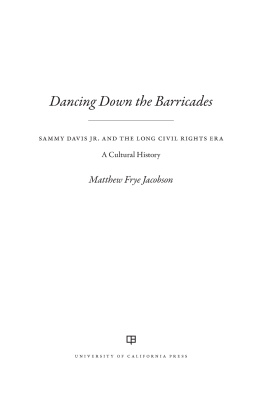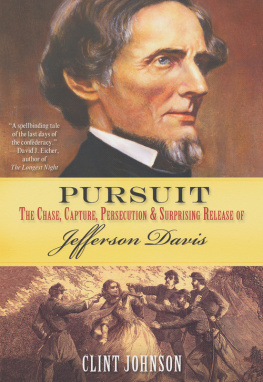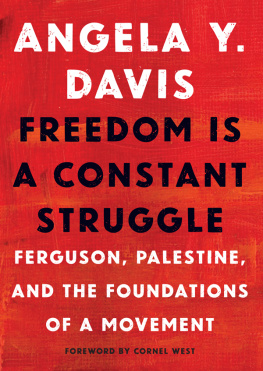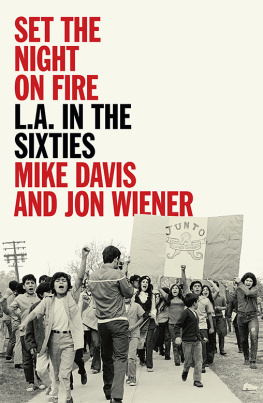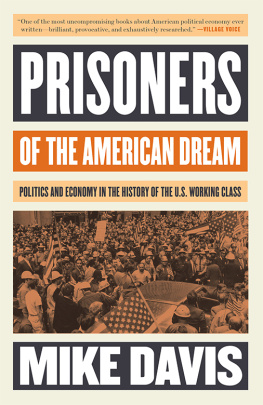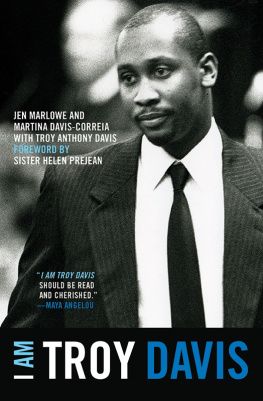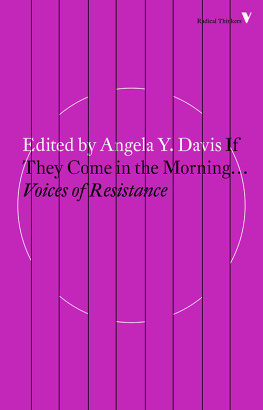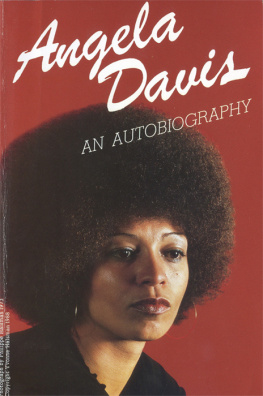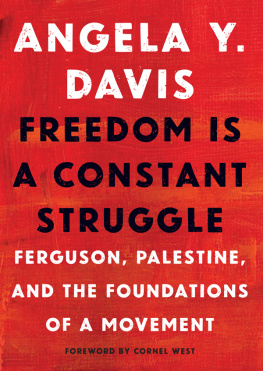PREFACE TO THE FIRST EDITION
This book is a personal account of my experiences in the movement to free Angela Davis. I have tried to present an historically accurate record of the events leading up to her trial, and of the struggle to save her life.
The book is based upon my personal recollections and notes, as well as the files of the National United Committee to Free Angela Davis, and the transcripts of the proceedings and appeals in the trials of James McClain, Ruchell Magee, Fleeta Drumgo, John Clutchette, George Lester Jackson and Angela Davis. News stories by Mark Allen, Juan Lopez, Ellis Goldberg and Robert Kaufman in the Peoples World and the Daily World between August 1970 and June 1972 were also extremely helpful.
For those who may be interested in further research or information on the Davis case, the files of the National United Committee to Free Angela Davis have been preserved in the archives of the Main Library at Stanford University in Palo Alto, California. This collection includes tens of thousands of letters received by the Committee and Ms. Davis from people throughout the world. The complete transcript of the Davis trial, including all appeals and legal memoranda, have been preserved in the Meiklejohn Civil Liberties Library in Berkeley, California.
I am deeply indebted to a great many people who read this manuscript in whole or in part, and offered invaluable suggestions and criticisms; and to members of the staff of the National United Committee to Free Angela Davis, and to comrades and friends and members of my familyall of whom offered their time and energy in recalling events and their impressions of them, and in providing me with much background material. Without their help, encouragement and support this book could not have been written.
My appreciation then, to: John Abt, Franklin Alexander, Kendra Alexander, Anthony Amsterdam, Fay P. Aptheker, Herbert Aptheker, Robert A. Baker, Archie Brown, Margaret Burnham, Angela Y. Davis, Ellis Goldberg, Fania Davis Jordan, Jack Kurzweil, Albert J. Lima, Helen Lima, Susana Magdaleno, Victoria Mercado, Charlene Mitchell, David Newman, Gary Schuller, Jessica L. Treuhaft, Gloria Trevino, Jean Stein, Margaret Wilkinson and Henry Winston.
I wish to express a special word of gratitude to Mary M. Timothy. As foreperson of the jury that acquitted Angela Davis, and ultimately as colleague and friend, she has provided me with a wholly unique and steady source of insight, enthusiasm and encouragement.
INTRODUCTION TO THE CORNELL PAPERBACKS EDITION
Angela Davis was brought to trial in 1972 in San Jose, California, on charges of murder, kidnapping, and conspiracy. Davis, placed on the FBIs Ten Most Wanted list and designated armed and dangerous, had been arrested in New York City on October 13, 1970. President Richard M. Nixon congratulated the FBI on its capture of the dangerous terrorist, Angela Davis, a sentiment echoed by Ronald Reagan, then governor of California, and by an editorial in the New York Times (October 16, 1970). Images of a handcuffed Davis appeared on the covers of Newsweek and other leading journals. News media vied to give maximum coverage to her case. Davis, an African American Communist, faced the death penalty at the time of her arrest. She had been a lecturer in the philosophy department at UCLA and was a doctoral candidate in philosophy at the University of California, San Diego.
The Black community was virtually unanimous in its support of Angela Davis. Her arrest came only a year and a half after the assassination of Dr. Martin Luther King, Jr., and in the wake of ghetto uprisings that had seen hundreds of African American people wounded and killed. Likewise, campus civil rights and antiwar protests had resulted in the wounding and killing of scores of students from Jackson State University in Mississippi to UC Berkeley. The Ohio National Guard had shot and killed students at Kent State University in May 1970, only five months before Daviss arrest.
At the time of her arrest Angela Davis was a member of the Che-Lumumba Club of the U.S. Communist Party in Los Angeles. This was an all-Black collective named in memory of Che Guevara, a hero of the Cuban Revolution, and Patrice Lumumba, the leader of the Congolese National Liberation Movement. Davis was also closely associated with the Los Angeles chapter of the Black Panther Party (BPP).
The Davis trial unfolded as state and federal authorities coordinated a nationwide assault against the Black Panther Party. They raided BPP offices, confiscated papers, and destroyed equipment. Police agents infiltrated the BPP itself. Many individuals fell victim to this intrigue. Those killed included Fred Hampton, MarkClark, Bobby Hutton, and Jon Huggins. Among those wounded by police and imprisoned were Assata Shakur and Huey P. Newton, cofounder of the BPP. Others stood trial in the media spotlight. Ericka Huggins was tried for murder in New Haven, Connecticut, and acquitted. Bobby Seale, also a cofounder of the BPP, was tried for conspiracy in Chicago for his participation in protests at the 1968 Democratic National Convention. When he protested the proceedings, Seale was bound and gagged in the courtroom He was acquitted along with his seven (white) codefendants. A subsequent congressional investigation determined that the Chicago police themselves had rioted and been responsible for countless injuries, including the beating of Dan Rather, a leading CBS reporter.
Geronimo Pratt, a BPP member and Vietnam veteran, was tried for murder in Los Angeles and was convicted. Pratt was released in 1997 after twenty-seven years in prison when his attorneys presented new, incontrovertible evidence of his innocence. The Los Angeles Police Department and the FBI, they contended, had been aware of this evidence at the time of Pratts arrest and had suppressed it. A year after his release, Pratt sued the FBI and LAPD for false arrest. Mumia Abu-Jamal, a journalist who covered the Panthers activities in Philadelphia and served as their minister of information, remains on death row, convicted of killing a white police officer. Appeals are pending. His book, Death Blossoms , is exemplary of writings by political prisoners.
Angela Davis was a founding member of the Soledad Brothers Defense Committee. The Soledad Brothers were three Black prisoners accused of killing a guard at Soledad Prison, near Salinas, California, in January 1970. George Jackson, Fleeta Drumgo, and John Clutchette were activists in a movement for prisoners rights. Angela Davis knew the families of all the accused men. She was particularly close to George Jacksons family and knew his younger brother, Jonathan. She had attended pretrial hearings of the Soledad Brothers, and was widely and publicly identified with their defense. She had corresponded with George Jackson. Sometime in the spring of 1970 she and George had become personally committed to each other.
THESE ARE the specific events that led to the prosecution of Angela Davis. On August 7, 1970, Jonathan Jackson, an African American high school student who was 17 years old, took over a courtroom in Marin County, California. He was heavily armed. A trial was in progress. The defendant in that trial was James McClain, a San Quentin prisoner accused of attempting to assault a guard. Ruchell Magee, another San Quentin prisoner, was on the witness stand testifying for McClain, who was acting as his own counsel. A third prisoner, William Christmas, was waiting to testify. The judge was Harold Haley; the prosecutor was Gary Thomas, who was Judge Haleys son-in-law. All the prisoners were Black. The judge, the prosecutor, and the jurors were white.


